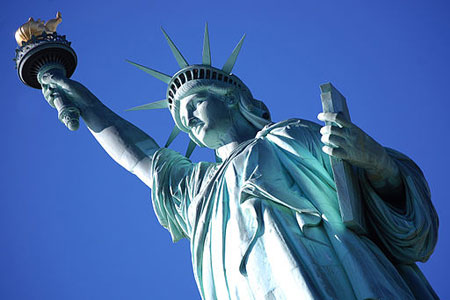We see and hear allusions all the time. Often, when we listen to a newscast or read a novel or poem, we will hear or see a reference to a name or idea that has become common knowledge. By understanding the allusion and its implied meaning, we understand the comparison being made.
See if you can figure out these popular allusions. Click on your choice.

- “Big Brother is watching” refers to—
- “A Herculean task” refers to—
- “He’s just a Romeo” refers to—
- “She’s a good Samaritan” refers to—
 Now, let’s look at a poem that many immigrants have seen and know. The poem is “The New Colossus” by Emma Lazarus. This poem can be found engraved on the Statue of Liberty. Read the poem below, and then use your notes to answer the questions. When you are finished, check your understanding to see possible responses.
Now, let’s look at a poem that many immigrants have seen and know. The poem is “The New Colossus” by Emma Lazarus. This poem can be found engraved on the Statue of Liberty. Read the poem below, and then use your notes to answer the questions. When you are finished, check your understanding to see possible responses. 
Source: Miss Liberty II (3010066621), Ludovic Bertron, Wikimedia
The New Colossus
Not like the brazen giant of Greek fame,
With conquering limbs astride from land to land;
Here at our sea-washed, sunset gates shall stand
A mighty woman with a torch, whose flame
Is the imprisoned lightning, and her name
Mother of Exiles. From her beacon-hand
Glows world-wide welcome; her mild eyes command
The air-bridged harbor that twin cities frame.
“Keep, ancient lands, your storied pomp!” cries she
With silent lips. “Give me your tired, your poor,
Your huddled masses yearning to breathe free,
The wretched refuse of your teeming shore.
Send these, the homeless, tempest-tost to me,
I lift my lamp beside the golden door!”
- What does “Colossus” refer to in the title of the poem?
- In line 4, the poet references “a mighty woman with a torch.” Who is this woman?
Sample Responses:
- “Colossus” refers to a famous statue, the Colossus of Rhodes, which is one of the Seven Wonders of the Ancient World. It depicts Helios, the sun god.
- The woman is the Statue of Liberty, who welcomed immigrants as they arrived at Ellis Island.
Often, allusions come from famous pieces of literature that everyone knows, such as The Wizard of Oz, mythology (like the example above), or the Bible. They may even reference famous works of art or real events.